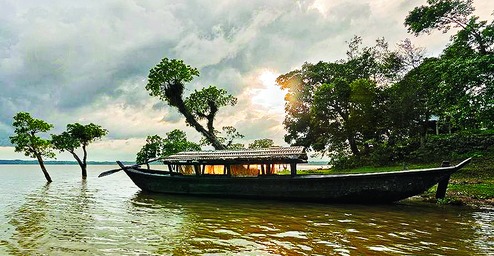
Hailakandi, May 5: The Assam government has decided to develop Sonbeel, a lake in Karimganj district of Assam's Barak Valley, as a tourist hotspot. Chief minister Sarbananda Sonowal has directed to make it a tourist spot by constructing a helipad and a tourist lodge.
Sonbeel, about 60km from Karimganj town, is the second largest seasonal wetland in Asia and the largest one in Assam. The Union ministry of environment and forests granted it the status of national wetland in 2008. This is the second waterbody in Assam which has been accorded the status after Deepor Beel.
Its distinctive landscape is formed by the hizol trees (Barringtonia Acutangula), which thrives even when it is half submerged in water. In winter, Sonbeel becomes a farmland where boro paddy is cultivated. From March, this piece of land slowly gets filled with water and becomes a lake.
Sonbeel measures about 3,458.12 hectares. The water area of the lake is 35 square km in summer and 10 square km in winter. Subrata Bhattacharjee, BJP district president of Karimganj, said Sonowal, during his visit to Karimganj district two days ago, stressed the need for making Sonbeel a tourist spot with accommodation for 40 tourists. He said Sonowal has asked Karimganj deputy commissioner Pradip Kumar Talukdar to prepare a concrete plan.
Sonbeel is famous for its fish and feeds most of Karimganj and Hailakandi districts.
Biswajyoti Bhattacharjee, a poet, said the scenic beauty and special features of the waterbody have immense scope for attracting tourists.
Sonbeel's people are poor, fishing being the main source of income. The small fishes are illegally caught by fishermen immediately after breeding. To prevent this type of fishing, the government has banned the use of nets from March to July. Over 50,000 families are dependent on selling fish. Harakumar Das, a farmer, said their life depends on the weather. This year, they suffered heavy losses after early rain washed away the paddy. He said the Sonbeel's soil is so alluvial that everything grows without any fertilizer. He said bad roads make it difficult to reach nearby markets.
Sumonta Das, a fisheries department officer from Sonbeel, said people there change their profession according to the season. In summer, they take up fishing and in winter, they take to farming.










